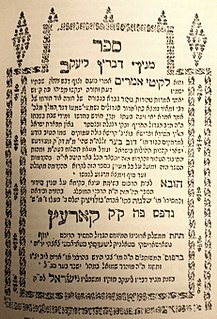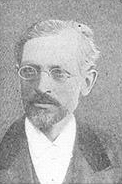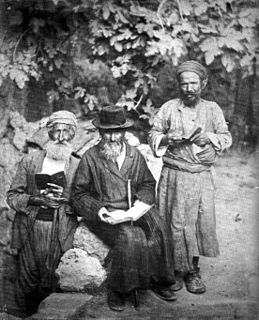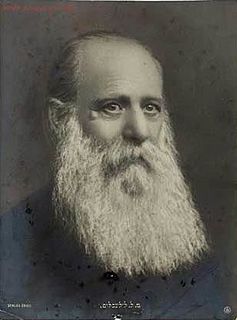Related Research Articles
Hillel is frequently used as a name. It may refer to:

Shneur Zalman of Liadi, was an Orthodox rabbi and the founder and first Rebbe of Chabad, a branch of Hasidic Judaism, then based in Liadi in the Russian Empire. He was the author of many works, and is best known for Shulchan Aruch HaRav, Tanya, and his Siddur Torah Or compiled according to the Nusach Ari. Zalman is a Yiddish variant of Solomon and Shneur is a Yiddish composite of the two Hebrew words "shnei ohr".

Dov Ber ben Avraham of Mezeritch, also known as the Maggid of Mezritch, was a disciple of Rabbi Yisrael Baal Shem Tov, the founder of Hasidic Judaism, and was chosen as his successor to lead the early movement. Dov Ber is regarded as the first systematic exponent of the mystical philosophy underlying the teachings of the Baal Shem Tov, and through his teaching and leadership, the main architect of the movement. He established his base in Mezhirichi, which moved the centre of Hasidism from the Baal Shem Tov's Medzhybizh, where he focused his attention on raising a close circle of great disciples to spread the movement. After his death, avoiding the unified leadership of the first two generations, this third generation of leadership took their different interpretations and disseminated across appointed regions of Eastern Europe. Under the inspiration of their teacher, this rapidly spread Hasidism beyond Ukraine, to Poland, Galicia and Russia.
Acharonim in Jewish law and history, are the leading rabbis and poskim living from roughly the 16th century to the present, and more specifically since the writing of the Shulchan Aruch in 1563 CE.
A maggid, also spelled as magid, is a traditional Jewish religious itinerant preacher, skilled as a narrator of Torah and religious stories. A preacher of the more scholarly sort was called a darshan, and usually occupied the official position of rabbi. The title of maggid mesharim probably dates from the sixteenth century.

Moritz Steinschneider was a Bohemian bibliographer and Orientalist. He received his early instruction in Hebrew from his father, Jacob Steinschneider, who was not only an expert Talmudist, but was also well versed in secular science. The house of the elder Steinschneider was the rendezvous of a few progressive Hebraists, among whom was his brother-in-law, the physician and writer Gideon Brecher.

Avraam/Albert Yakovlevich Harkavy, or Avraham Eliyahu ben Yaakov Harkavy was a Russian historian and orientalist.
Abraham ben Abraham, also known as Count Valentine Potocki, was a purported Polish nobleman (szlachta) of the Potocki family who converted to Judaism and was burned at the stake by the Roman Catholic Church because he had renounced Catholicism and had become an observant Jew. According to Jewish oral traditions, he was known to the revered Talmudic sage, the Vilna Gaon, and his ashes were interred in the relocated grave of the Vilna Gaon in Vilna's new Jewish cemetery.
Abraham Dov Ber Lebensohn was a Lithuanian Jewish Hebraist, Haskalah poet and preacher.

David ben Solomon ibn (Abi) Zimra (1479–1573) also called Radbaz (רדב"ז) after the initials of his name, Rabbi David iBn Zimra, was an early Acharon of the fifteenth and sixteenth centuries who was a leading posek, rosh yeshiva, chief rabbi, and author of more than 3,000 responsa as well as several scholarly works.
Vidal of Tolosa was a Spanish rabbi and scholar of the late 14th century, and is often referred to by the sobriquet, Harav Ha-Maggid, or the Maggid Mishneh, named for his magnum opus by that name.

Moshe Leib Lilienblum was a Jewish scholar and author. He also used the pseudonym Zelaphchad Bar-Chuschim.

Rabbi Jonah ben Abraham Gerondi, also known as Jonah of Girona and Rabbeinu Yonah, was a Catalan rabbi and moralist, cousin of Nahmanides. He is most famous for his ethical work The Gates of Repentance.
Jacob ben Judah Landau was a German-Italian rabbi and halakhic codifier, who wrote the halakhic digest The Agur (האגור).

Avot de-Rabbi Nathan, usually printed together with the minor tractates of the Talmud, is a Jewish aggadic work probably compiled in the geonic era. Although Avot de-Rabbi Nathan is the first and longest of the "minor tractates", it probably does not belong in that collection chronologically, having more the character of a late midrash. In the form now extant it contains a mixture of Mishnah and Midrash, and may be technically designated as a homiletical exposition of the Mishnaic tractate Pirkei Avot, having for its foundation an older recension (version) of that tractate. It may be considered as a kind of "tosefta" or "gemarah" to the Mishna Avot, which does not possess a traditional gemarah. Avot de-Rabbi Nathan contains many teachings, proverbs, and incidents that are not found anywhere else in the early rabbinical literature. Other rabbinical sayings appear in a more informal style than what is found in Pirkei Avot.
Joseph ben Meir Teomim was a Galician rabbi born at Lemberg. While still young he succeeded his father in the position of preacher and rabbinical instructor in the yeshivah of Lemberg. Later he went to Berlin, where he stayed several years in the bet ha-midrash of Daniel Itzig. Then he resumed his former position at Lemberg, and in 1782 was appointed rabbi at Frankfurt an der Oder, where he remained until his death. He was buried on the Jewish cemetery at Frankfurt/Oder.
Isaac ben Jacob Benjacob was a Jewish, Russian-born Maskil, best known as a bibliographer, author, and publisher. His 17-volume Hebrew Bible included Rashi, Mendelssohn, as well as his own Mikraei Kodesh which "emended" the biblical text and helped spread the Haskalah movement.

Samuel Joseph Fuenn was a Russian scholar born in Vilnius, Vilna Governorate. He received the usual Talmudic education, and also acquired an extensive general knowledge of the profane sciences. In 1848 the government appointed him professor of Hebrew and Jewish history in the newly founded rabbinical school of Vilnius. Fuenn filled this position with great distinction till 1856, when he resigned. The government then appointed him superintendent of the Jewish public schools in the district of Vilnius, in which he introduced instruction in the secular sciences and modern languages. Fuenn also took an active part in the administration of the city and in its charitable institutions, and was for many years an alderman. In acknowledgment of his services the government awarded him two medals.
Isaac Elijah ben Samuel Landau was a Jewish-Russian preacher, exegete, and communal worker born at Vilna. At the age of 18 he settled at Dubno, his wife's native town, where he carried on a prosperous business. On Saturdays and holy days he used to preach in the synagogues, attracting large audiences. Owing to his eloquence Landau was chosen by the communities of Volhynia as member of the rabbinical commission appointed by the emperor in 1861, which necessitated his remaining for five months in St. Petersburg. In 1868 he was called to Vilna as preacher and dayan, which office he held till his death. At Vilna he established a kosher kitchen for Jewish soldiers.
The Romm publishing house, a publisher of Jewish religious literature from 1788 to 1940, was especially known for its 1886 Vilna Talmud, which still serves as a definitive edition.
References
